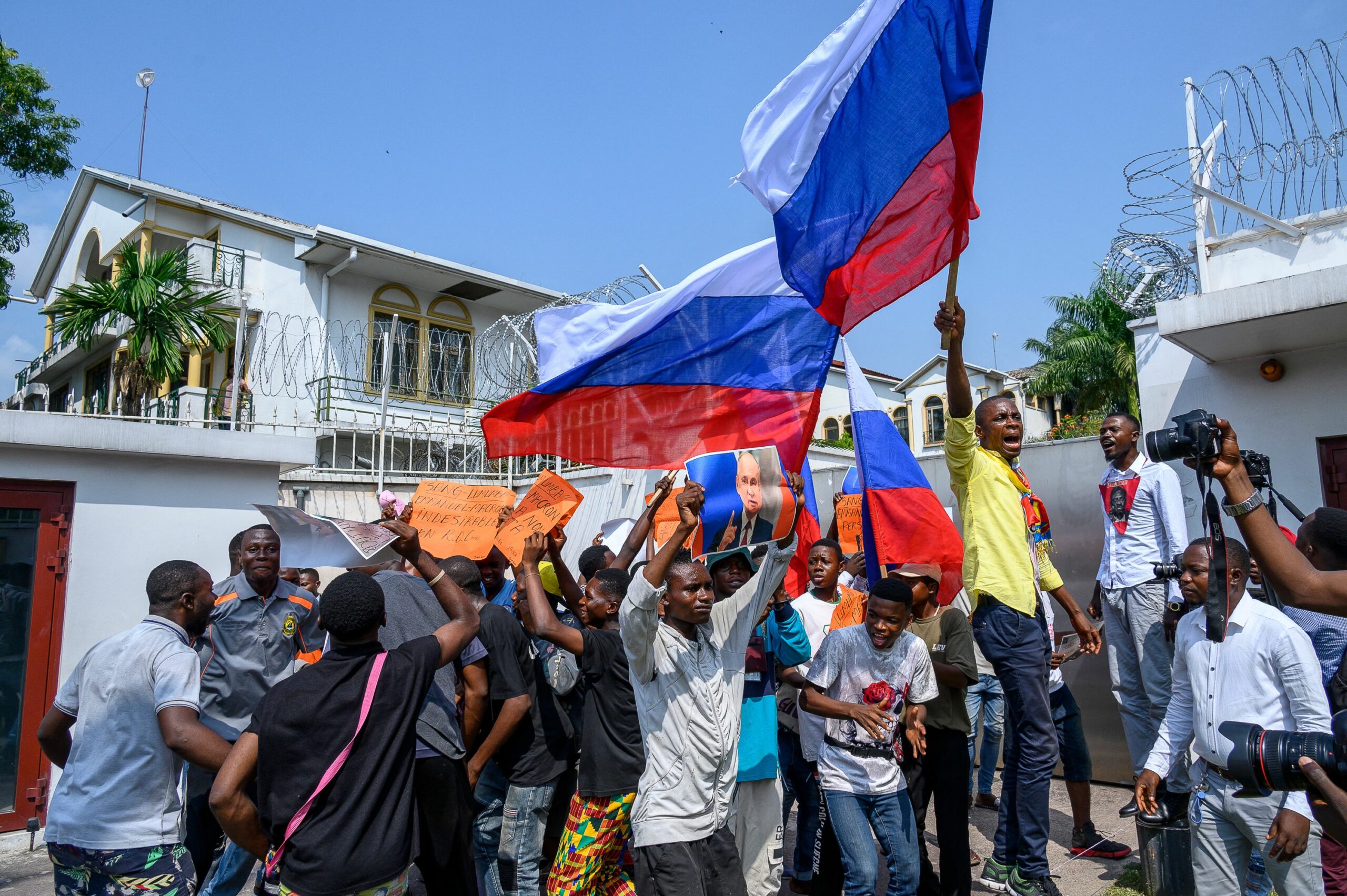Since 1991, the transformation of Russia’s foreign policy has been characterised as a transition from messianism to pragmatism or geopolitical reasoning. Namely, Moscow abandoning its Cold War messianic strategy of patronising foreign Communist Party branches and Communist-aligned movements is taken as evidence of Russia prioritising state interests over ideology. In this version, Moscow ruthlessly pursues its interests in the sobriety of a Realpolitik vision of the world. In this context, Russia’s Africa policy is a coup de grâce on the geopolitical chessboard, striking where the West has been faltering. Russia is thus seen as pursuing a cold, calculating policy in a ‘new scramble’ for Africa.
There is no doubt that Moscow’s recent moves in the African continent play into Russia’s great power ambitions and revisionist agenda. Through arms sales, deployments of the state-aligned Wagner Private Military Company (PMC), and traditional diplomacy, Russia has been empowering clients, targeting civilians in conflicts, and undermining international norms. Russia has also positioned itself as an alternative and direct competitor to the West for security cooperation, energy, and mining. In 2023, the second Russia-Africa Summit and the BRICS Summit in South Africa will only reinforce Russia’s push to the continent.
At the same time, however, Russia’s moves on Africa are animated by more than opportunism and expediency, as they are elsewhere in the world. Russia’s invasion of Ukraine has made cruelly evident the role of myths, civilisational identity, and messianism in Moscow’s foreign policy. Why are we reading Russia’s moves in Africa as separate from these other sources of its foreign policy, limiting their analysis to the chessboard? Here I zoom into one of these sources, to investigate the relevance of messianism in today’s Russian Africa policy.
Messianism: the ideology. Russia’s ‘multipolarity’
Messianism is not an uncommon ideological feature in foreign policy, especially among the great powers. The content of Russia’s hybrid messianism in foreign policy has many aspects, but the notion of ‘multipolarity‘ (многополярность, sometimes rendered полицентричный мир) stands out as central. In the Realist conception, a multipolar world is one where there are several states acting as competing power poles, each one attracting (or coercing) smaller states into their orbit. This is a rather pessimistic worldview, rife with intractable conflict, with smaller states helpless in the face larger hegemons, and with great power politics trumping democratic deliberation or legitimacy.
The Kremlin has espoused ‘multipolarity’ as a core foreign policy concept — I would argue, pace other interpretations — precisely for this reason. Namely, ‘multipolarity’ fits into the inherent pessimism of Russian messianism. In the Kremlin’s version, ‘multipolarity’ concerns different civilisations of ‘traditional societies’, on which the West attempts to impose its ‘globalist’ values and ‘unipolar’ and ‘colonial’ order. In this narrative, truly sovereign states (i.e., the great powers) such as Russia are tasked with the mission to join lead the non-West ‘world majority’ for restraining the West’s imposition of ‘decadent‘ ‘globalist‘ values. (In other words, to assume the role of the katechon, that what restrains the coming of the Antichrist. Not surprisingly, as argued by Alicja Curanovic, the Russian Orthodox Church sees multipolarity as a core element of Russia’s ‘mission’ in the world.) As a pro-active ideology, ‘multipolarity’ is, simultaneously, a reality (Lavrov: multipolarity is an ‘objective and unstoppable process‘) and a political project, thwarted by the recalcitrant West (Putin: ‘multipolarity in the world is inevitable, despite attempts to prevent it’).
Africa has been routinely identified in Russian academic and policy circles as an emerging power pole in the world, and thus a participant in the ‘multipolarity’ political project. The 2023 Foreign Policy Concept alludes to this role for the continent. At the 20 March Russia-Africa interparliamentary conference, Putin referred to ‘Africa’ as a leader in the multipolar world, hailing the continent’s large (approximately 1,2 billion people) and growing population. However, Putin, in his 20 March speech, spoke of Russia’s role being to ‘extend a helping hand‘ to the countries of Africa, particularly against the West’s ongoing ‘neocolonialism’. The dual sense of ‘multipolarity’ is in display here. While Africa is its own ‘pole’, it still requires assistance from Russia to stand as one.
Yet, Russia struggles with the African application of its multipolarity doctrine. The UN Charter and Pan-Africanism are leading notions in African international relations, and neither one fits well together with the Russian notion of ‘multipolarity’. The UN Charter establishes a universal normative framework that emphasises the equality of all sovereign states, which does not fit well with the notion of ‘sovereignty’ in Russia’s ‘multipolarity’. Then, Pan-Africanism is a normative concept that goes against the notion of there being an African hegemon that can account for the continent. The continental institutions modelled after Pan-Africanism — notably the African Union — usually attempt to check the power of the ‘Big Five’ (Algeria, Egypt, Ethiopia, Nigeria, and BRICS member South Africa). Similarly, Russia’s understanding of ‘sovereignty’ is inimical to the solidarist aspirations in African international relations. Finally, Pan-Africanism is not necessarily, inherently anti-Western.
Russian foreign policy has responded to these struggles by co-opting or ‘hijacking‘ a certain vision of ‘Pan-Africanism’. The 2019 leaked Wagner Africa papers hint at what are Russia’s attempts at marrying its notion of ‘multipolarity’ with its interpretation of ‘Pan-Africanism’. Namely, the exclusion of Western powers from Africa under the guise of African ‘sovereignty‘. On this element, there are some core similarities between Moscow’s current and Cold War-era Africa policies: a scope that includes all of Africa, and an emphasis on the continent’s sovereignty.
Messianism: the policy. Russia and ‘Pan-Africanism’
The Kremlin’s understanding of ‘multipolarity’ in Africa is especially visible in two policies: adopting a continental scope and courting ‘Pan-African’ political entrepreneurs. Both choices respond to a mixture of cost-benefit analysis and Russia’s messianic foreign policy.
Russia’s African diplomacy indeed boasts a continental scope. This was conspicuously on display during the 2019 Russia-Africa Summit, when representatives of all African states travelled to the Sochi Olympic Village, including 43 heads of state. Most recently, the 2023 Russia-Africa parliamentarian summit hosted delegations from 37 different countries. Russia is invested in securing a similar participation in the 2023 second Russia-Africa Summit. This continental scale is meant to emulate the scope of the United States (e.g., AFROCOM), thus portraying Russia as a peer great power. At the same time, to approach the continent as a group brackets all the African states into one ‘African’ ‘sovereign’ choice, namely, of engaging Russia as a decision made by Africa as a singular ‘pole’. Russia’s continental approach to African affairs helps Moscow bolster is great power claims, but often fails to deliver benefits, especially for ordinary Africans. Alternative formats (i.e., not continental) are possible, privileging other uniting factors.
Patronising ‘Pan-African’ political entrepreneurs is related to the Kremlin’s long-standing courting and co-opting of radical intellectuals and political movements, such as the Western far-right. It should be no surprise then that Moscow is making common cause with radical political entrepreneurs in Africa, too. In fact, there is a far-right bent in the Kremlin’s ‘Pan-Africanism’, starting with the conservative bias subjacent in the notion of ‘multipolarity’. (Crypto-fascist oligarch Konstantin Malofeev was a speaker and one of the sponsors of the 2019 Russia-Africa Summit, for instance.) This courting is a policy implemented directly by Russian embassies on the continent. For example, in the Democratic Republic of Congo, on 28 March 2023, the Russian embassy held an event on Africa as a world pole, inviting a member of parliament and local ‘activists’.
One prominent Russian client is Stellio Gilles Capoсhichi, better known for his alias, ‘Kémi Séba’. The French-Beninois self-proclaimed ‘Pan-Africanist‘ political entrepreneur has been active for two decades, today heading the organisation Urgences panafricanistes or Urpanaf. Séba’s platform has consistently been one of Antisemitism, making common cause with European white nationalist groups, and recently praising the Burkina Faso and Mali juntas. A 2019 report by Proekt Media lists twelve branches of Urpanaf, with new ones opening later in the Democratic Republic of Congo, including in the Kivus.
At each step, a shared civilisational discourse has brought Séba and his Russian counterparts together. The content of Séba’s ideology hinges on demanding the separation of black people from the West and globalisation, and to ‘return‘ to Africa, including physically. Séba has identified Russia as one of his ‘geopolitical allies‘, a partner for Africa to create a ‘multipolar’ world to limit Western hegemony. Since Russia launched its full-scale invasion against Ukraine, Séba has sided with Moscow, saying Russia is fighting a war against ‘Globalism’ and calling Volodymir Zelensky a ‘puppet‘. Séba has attempted to strike a balance regarding Russia by stating that Africa will not accept new colonisers, including Russia.
Beyond discourse, Russia has been in Séba’s horizon in the past few years, initially partnering with Aleksander Dugin in 2017, later with Yevgeny Prigozhin, and currently with the Russian government directly. All throughout those years, Russia’s far-right media (including those outlets allegedly owned by Malofeev), Dugin and his deceased daughter have written about Séba. Recently, Séba’s Russian liaisons took a turn and became more overtly connected to the Russian government. During his October 2022 visit to Moscow, he shared a panel with the Africa and Middle East special representative of the Russian Federation Mikhail Bogdanov, the president of AFRICOM Igor Morozov, and the head of Russia’s ‘aid’ agency, Yevgeny Primakov jr. RT and the Gorchakov Fund were also listed among the event’s partners. He would speak again in Moscow in March 2023, at the Duma during the Russia-Africa parliamentarian summit.
Russian messianism comes to Africa
Russia’s Africa policy draws from many sources and not only from single-minded ‘rational’ cost-benefit analysis. Indeed, with the end of the Cold War, Moscow did not abandon messianism as an element of its international relations, including in Africa, too. The Kremlin pursues its messianic ‘multipolarity’ doctrine in Africa primarily by insisting on ambitious continent-wide political initiatives, and by siding with figures donning the mantle of ‘multipolarity’. Séba’s case illustrates the fragmentation of Russian foreign policy across different actors (Dugin, Malofeev, Prigozhin, Bogdanov) as well as the role of ideological affinity for such transnational coalitions to emerge. Séba and others like him might not be proxy forces but actors whose pessimistic worldview draws them to the Kremlin and vice versa. Pan-Africanism is a normative concept and a cornerstone for international relations in the continent, most notably the African Union and the aspirations it embodies. The distortion of Pan-Africanism in service of Russia’s ambitions and of these fringe entrepreneurs is a disservice to the continent.










